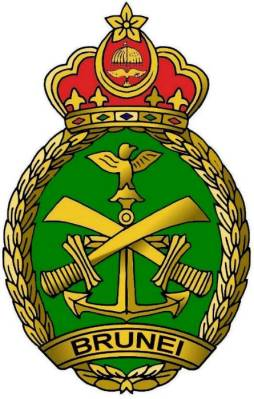
Brunei, officially Brunei Darussalam, is a country in Southeast Asia, situated on the northern coast of the island of Borneo. Apart from its coastline on the South China Sea, it is completely surrounded by the Malaysian state of Sarawak, with its territory bifurcated by the Sarawak district of Limbang. Brunei is the only sovereign state entirely on Borneo; the remainder of the island is divided between its multi-landmass neighbours of Malaysia and Indonesia. As of 2023, the country had a population of 455,858, of whom approximately 180,000 resided in the capital and largest city of Bandar Seri Begawan. Its official language is Malay and Islam is the state religion of the country, although other religions are nominally tolerated. The government of Brunei is an absolute monarchy ruled by the Sultan, and it implements a fusion of English common law and jurisprudence inspired by Islam, including sharia.
Brunei maintains diplomatic relations with 170 out of 193 countries, joined ASEAN on 7 January 1984, one week after resuming full independence, and gives its ASEAN membership the highest priority in its foreign relations. Brunei joined the United Nations in September 1984. It is also a member of the Organisation of Islamic Cooperation (OIC), the Asia-Pacific Economic Cooperation (APEC) forum and the Commonwealth of Nations. Brunei hosted the APEC Economic Leaders' Meeting in November 2000. In 2005 it attended the inaugural East Asia Summit.

The Brunei dollar, has been the currency of the Sultanate of Brunei since 1967. It is normally abbreviated with the dollar sign $, or alternatively B$ to distinguish it from other dollar-denominated currencies. The currency is divided into 100 cents and is issued by the Brunei Darussalam Central Bank.

Mohamed Bolkiah ibni Omar Ali Saifuddien III is a member of the royal family of Brunei. He is the second son of Omar Ali Saifuddien III, the 28th Sultan of Brunei, and Raja Isteri (Queen) Pengiran Anak Damit. After Brunei's independence in 1984, he became the country’s first foreign minister, serving from 1 January 1984 until 22 October 2015, alongside the second Minister of Foreign Affairs and Trade, Lim Jock Seng.

The Royal Brunei Navy (RBN), natively known as Tentera Laut Diraja Brunei (TLDB) is the naval force of Brunei. It is a small but relatively well-equipped military force whose main responsibility is to conduct search and rescue missions, and to deter and defend the Brunei waters against attack mounted by seaborne forces.

The Legislative Council of Brunei is a national unicameral legislature of Brunei. The council comprises 36 appointed members, that only has consultative tasks. Under Brunei's 1959 constitution, His Majesty Hassanal Bolkiah is the head of state with full executive authority, including emergency powers since 1962. The Council holds its sitting annually in March at the Legislative Council Building in Bandar Seri Begawan.

The 1999 SEA Games, officially known as the 20th SEA Games and commonly known as Brunei Darussalam 1999, was a Southeast Asian multi-sport event held in Bandar Seri Begawan, Brunei. This was the first time Brunei hosted the Southeast Asian Games and also in Borneo island. These were the last to have ever staged during the 20th century, and this was the only occasion, to date, that Brunei had held the SEA Games.

The prime minister of Brunei is the head of government of Brunei. Concurrently, the title is held by the sultan of Brunei, who as sultan is also the head of state of the country. The prime minister, minister of foreign affairs, minister of finance and economy, and minister of defence are all the Sultan of Brunei. He is Brunei's Supreme Executive Authority in his capacity as the Sultan and Yang Di-Pertuan. The Privy Council, the Council of Succession, the Religious Council, the Council of Cabinet Ministers, and the Legislative Council support him in carrying out his responsibilities.
The Brunei Times was an independent English-language daily compact broadsheet newspaper published in Brunei Darussalam from 2006 to 2016. It was owned by Brunei Times PLC.

The Universiti Brunei Darussalam is a public national research university situated in Bandar Seri Begawan, the capital of Brunei, was founded in 1985 and is the oldest institution in the country. Nine research institutes, six academic service centres, and eight academic faculties make up the institution.

The following outline is provided as an overview of and a topical guide to Brunei:

The Royal Brunei Armed Forces (RBAF); Malay: Angkatan Bersenjata Diraja Brunei (ABDB), Jawi: رايول بروناي آرميد فوس, is the official organisation and collective term for all of the military forces or service branches of the sultanate of Brunei Darussalam. The RBAF consists of three primary military branches; the Royal Brunei Land Force, the Royal Brunei Navy, and the Royal Brunei Air Force.

United Nations Security Council resolution 954, adopted unanimously on 4 November 1994, after recalling Resolution 733 (1992) and all relevant resolutions on the situation in Somalia and a recent security council mission to the country, the Council noted the lack of progress in the peace process and decided, under Chapter VII of the United Nations Charter, to extend the mandate of the United Nations Operation in Somalia II for a final time, until 31 March 1995.

United Nations Security Council resolution 1263, adopted unanimously on 13 September 1999, after reaffirming all previous resolutions on the question of the Western Sahara, the Council extended the mandate of the United Nations Mission for the Referendum in Western Sahara (MINURSO) until 14 December 1999.

United Nations Security Council resolution 1476, adopted unanimously on 24 April 2003, after recalling all previous resolutions on Iraq, including resolutions 661 (1991), 986 (1995), 1409 (2002), 1454 (2002) and 1472 (2003) concerning the provision of humanitarian aid to the Iraqi people, the council extended the Oil-for-Food Programme until 3 June 2003.

Hassanal Bolkiah Muiz'zaddin Wad'daulah is Sultan of Brunei since 1967, and prime minister of Brunei since its independence from the United Kingdom in 1984. He is one of the few remaining absolute monarchs in the world.

Brunei, officially known as Brunei Darussalam, competed at the 2016 Summer Olympics in Rio de Janeiro, Brazil, from 5 to 21 August 2016. This was the nation's seventh appearance at the Summer Olympics since its debut at the 1988 Summer Olympics. Brunei failed to register any athletes in two editions of the Games: 1992 in Barcelona and 2008 in Beijing.

Halbi bin Haji Mohammad Yussof is a Bruneian aristocrat, politician and retired military office who is the incumbent Minister at the Prime Minister's Office and Minister of Defence II. He is a former member of the Legislative Council of Brunei, and previously served as the Minister of Defence II from 2018 to 2022, Minister of Culture, Youth and Sports from 2015 to 2018, Commander of the Royal Brunei Armed Forces (RBAF), and Commander of the Royal Brunei Land Force (RBLF).

The Ministry of Defence Brunei Darussalam, officially abbreviated as MinDef, is a cabinet-level ministry of the Government of Brunei. It is responsible for the national security and its military forces within the sultanate of Brunei Darussalam; the latter collectively known as the Royal Brunei Armed Forces (RBAF); Angkatan Bersenjata Diraja Brunei, (ABDB). MinDef is Brunei's ministry of defence; and was established on 1 January 1984, when Brunei Darussalam achieved independence from the United Kingdom. The Ministry of Defence leadership presently consists of a minister ; its incumbent is the Sultan of Brunei, Hassanal Bolkiah, who is also the Supreme Commander of the RBAF / ABDB. A deputy minister is second-in-command at the Ministry of Defence.

10th Summit of the Non-Aligned Movement on 1–6 September 1992 in Jakarta, Indonesia was the conference of Heads of State or Government of the Non-Aligned Movement. Around 100 delegations, including some 60 heads of State or government, participated in the Summit in Jakarta.
















